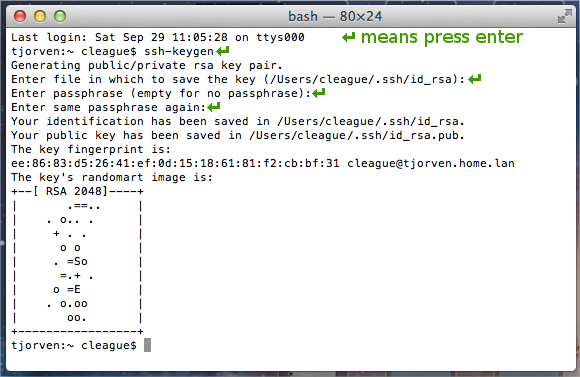Git Ssh Key Generate Mac
Generating a new SSH key. Open Terminal Terminal Git Bash. Paste the text below, substituting in your GitHub Enterprise email address. $ ssh-keygen -t rsa -b 4096 -C 'youremail@example.com' This creates a new ssh key, using the provided email as a label. Generating public/private rsa key pair. Whether you use Git or Mercurial, use this section to generate an SSH key using Sourcetree. When you create an SSH key with Sourcetree, you can save the public and private key wherever you want locally. You may want to create an SSH directory when you do, so that you can refer to your SSH keys.
This guide goes through setting up SSH keys on macOS Mojave 10.14 back to Mac OSX 10.11 and also a secure password-less SSH connection between a local macOS workstation and a remote server also running a Linux variant operating system.
The process requires generating a public and private key on the local computer and then adding the public key to the remote servers authorised list. What is great about this is that it allows a password prompt free session, handy for a lot of uses.
First thing that you need to do on your macOS machine is to create a directory that will store your SSH keys. Then you will generate a public and private key for your account, launch the Terminal and punch in some commands:
Create a .ssh Directory
Change to the home directory
Create a SSH directory name .ssh and move into it
Make sure that the file permissions are set to read/write/execute only for the user
Modern warfare 2 serial key generator. Create your private and public key, the blank quotes at the end of the command gives the private key no password, so allowing for passwordless logins!
Change into the .ssh directory and list the contents of that .ssh directory
Thats your SSH keys created, the private key is the id_rsa and the public one is the id_rsa.pub, don’t give out the private one always keep that one only on your local machine.
Sharing the Public Key
Create an authorized_keys in the .ssh directory of the remote computer that you want to connect to.
You can create automatic logins by adding the contents of your public key to the authorized_keys file on the remote device.
To see and copy your public key use the cat command and copy the contents:
On the remote computer if needed, change the permssions on the authorized_keys file to write to add the public key, on a new line paste in your public key, and change permissions back to read only after for security.
Allow write on authorised_keys
Paste the entire id_rsa.pub content with vi or nano into the authorized_keys file, if using nano use the -w flag to not use incorrect line breaks.

Generate certificate from public key. If the remote host does not have an “authorized_keys” file simply create one and after the public key is pasted in don’t forget to takeaway write permissions.
Going Both Ways
So now when you connect via SSH no password is prompted as the remote computer has your public key which is only decrypted by your private key held in your local .ssh/ directory. If you want the communications to be bilateral then repeat the process in the opposite order between the two.
Now the two computers can securely connect with no password prompting, making it ideal to script between the two for file copies or back ups.
Doing it Quicker
Now instead of typing in
Make an alias in your bash shell you could alias it to
Reload the the shell
Then all you have to type in is the alias
Related
Source links
Problem
As described in detail on https://openradar.appspot.com/27348363, macOS/OS X till Yosemite used to remember SSH keys added by command ssh-add -K <key>.
Unfortunately this way no longer works. Keys added to the keychain via ssh-add -K are not automatically re-added to the ssh-agent after a reboot. As Apple Developer stated:
'That’s expected. We re-aligned our behavior with the mainstream OpenSSH in this area.'
Solutions
Solution 1 (recommended)
Apple updated its Technical Notes to indicate that since 10.12.2, macOS includes version 7.3p1 of OpenSSH and its new behaviors.
In ~/.ssh create config file with the following content:
Solution 2
After usage of ssh-add -K <key> (it's recommended to use absolute path of keys) call the command ssh-add -A on every startup of macOS.
What Is Ssh Key
To automate this, add a .plist with the following content to the path ~/Library/LaunchAgents/:
Ssh Key Generation
Alternatives
Ssh Key Generation Linux
Create this file with the Lingon app.
Use
curlto download the .plist file to the stated path:
Notes
Mac Generate Ssh Key For Git
If you have issues with ssh-add: illegal option -- K after using the ssh-add -K command, you may use the full path of the command /usr/bin/ssh-add.